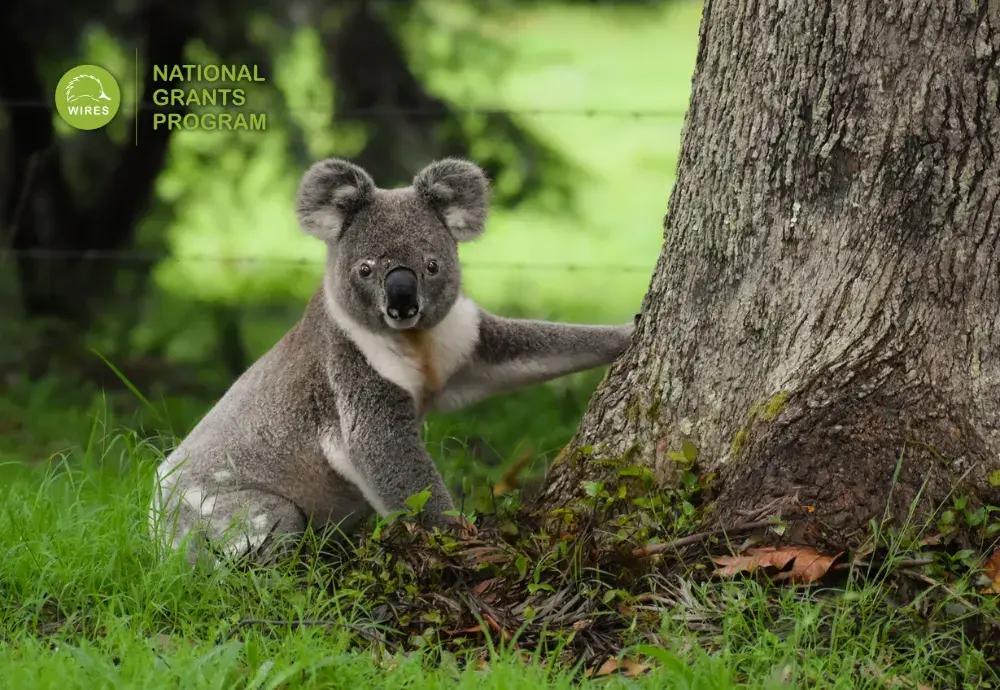WIRES Giving Day - Save the Wild!
September 2025
For emergency rescue support 24/7 please call 1300 094 737

Pictured: A koala at 2022 NGP recipient ReForestNow's regeneration site nearby 10,000 new rainforest trees funded by WIRES NGP.
The 2023 WIRES National Grants Program is open for applications from 14th July with $1million in funding available. The grants are for projects designed to support best practice rescue and rehabilitation of wildlife, native species recovery projects and increase emergency preparedness.
There are four tiers of grants ranging from $2,000 to $50,000 for individual licenced wildlife carers through to multi-partner collaborations.
WIRES will host two webinars to help potential applicants understand funding opportunities and the grant application process on the 18th and 26th of July.
“We really encourage individuals and larger organisations working in the wildlife space to apply for a grant this year,” said Jennie Murray, Head of Programs, WIRES. “Now that we are in our third year of this grants program, we can really see the impact this investment in the sector is making and we are excited to see what projects are happening around the country.
There are three special grants being offered each year:
The Mikla Lewis OAM Habitat Restoration and Enhancement Grant – up to $20K
When Mikla Lewis OAM founded WIRES in 1986, little did she envisage that 35 years later the organisation would have expanded from a single branch in Sydney to 28 branches and more than 3500 members. She decided to form WIRES, with the help of a small group of people from various environmental organisations, following a report of an injured ibis in Sydney’s Hyde Park when none of the existing animal welfare bodies had either the jurisdiction or the resources to implement a rescue. Mikla’s foresight and knowledge led to the rescue and rehabilitation of hundreds of thousands of native animals. To this day, she continues to be a dedicated WIRES volunteer.
The Helen George OAM Mammal Grant – up to $20K
From the moment WIRES was founded, Helen George’s expertise in wildlife rescue and care was invaluable. Helen’s involvement with WIRES as a carer, trainer, and mentor lasted more than 30 years, until her passing in 2017. When WIRES received its very first call for a wombat in distress, it was Helen’s advice that was sought. Over the years, Helen developed and delivered mammal training courses and trained hundreds of volunteers. This grant is as acknowledgement to the invaluable support and expertise Helen provided to WIRES and is a nod to her particular interest in wombats, macropods and bats.
The Pat Connors Avian Grant – up to $20K
Pat Connors was a long-term member of WIRES. He developed WIRES first rescue and rehabilitation database and call recording system pro-bono and supported it for well over a decade. Pat's contribution enabled WIRES to provide rescue advice and assistance for more than 1.5million animals since its creation. Pat sadly passed away in December 2020 and the grant is to honour Pat's outstanding contribution and his passion for birds.
A grant in action - 2021 Pat Connors Avian Grant recipient.
https://www.wires.org.au/blog/helping-endangered-cockatoos-wires-grant-success-story
WIRES is seeking projects that have tangible, positive and ideally long-term outcomes for wildlife.
Eligible applicants are invited to submit proposals for:
Tier 1: Individually Licenced Wildlife Rescuers and Carers (maximum $2,000)
Tier 2: Licenced Wildlife Rescue and Rehabilitation Organisations (maximum $8,000)
Tier 3: Environmental NGOs and Community Groups (maximum $20,000)
Tier 4: Consortia/Multi-partner Collaborations (maximum $50,000)
Grants open 14th July with applications closing 18th August. For more information, please visit https://www.wires.org.au/NGP
To arrange an interview with WIRES Head of Programs Jennie Murray please contact John Grant on media@wires.org.au.
Stay in touch and get our regular rescue stories, WIRES updates and a free copy of our 15 Ways to Help Wildlife ebook
September 2025
June 2025
May 2025
April 2025
March 2025
February 2024
July 2023